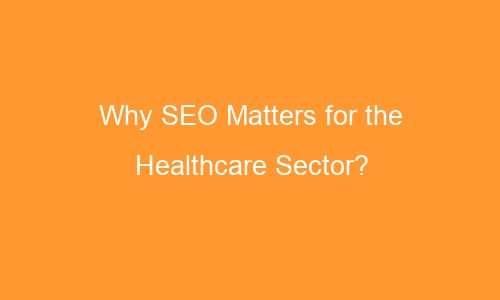Expanding your patient base and boosting your procedure volume is crucial for healthcare facilities. An SEO campaign can efficiently and economically help you reach prospective patients, establish your company as a medical authority, and increase your return on investment or ROI.
What Sets Medical Search Marketing Apart From the Rest?
Search engine optimization may be beneficial for most businesses. However, every company, particularly those in the healthcare sector, has its unique path to increased search traffic. Numerous health service providers, including physicians, software developers, pharmacies, and equipment manufacturers, might benefit from search engine traffic.A family doctor’s SEO approach may not be the best fit for a medical equipment business. This is due in part to the fact that healthcare encompasses both B2C and B2B audiences.
Healthcare SEO: What Makes It So Important?
Search engine optimization (SEO) in the healthcare industry is crucial for many reasons:
- You may contact individuals who are searching for you at the exact moment they need you with search engine optimization for health facilities and medical practices. SEO uses keywords to target various purposes, such as those seeking to transfer providers, locate emergency services, or engage in other similar activities.
- If you own an urgent care facility, for instance, you should target people in your neighborhood seeking emergency treatment rather than those shopping for an insurance provider.
- Just like any other digital marketing strategy, healthcare SEO produces quantifiable outcomes. Your business may reach the best possible audience and turn them into customers, clients, or even workers, thanks to its reach and relevance.
SEO makes healthcare more visible, helping people find the services and information they need. In the same way, casino777 uses SEO to attract new players and improve the experience of existing ones. Strategic optimization helps businesses in both fields meet their goals, rank higher, and get more people involved, all of which lead to better results and more business growth.
Bring In Visitors and Patients Who Need You
SEO tactics can help you attract visitors to your site, but what’s more important is that they can help you attract the right kind of people. Organic traffic from people searching for general health-related questions can come to your website, but not all of those people are likely to become customers. Anyone looking for medical help, a hospital, a doctor, or knowledge about a specific treatment should be drawn to your site.
SEO can help you do that by sending these people to your site right away. They are more likely to buy from you. In addition to using SEO to help your site rank higher in search results, an excellent digital marketing team can also help you create pages that encourage people to get in touch with you, either to make a meeting or to make the first contact.
Use SEO Strategies to Get Ahead Of Your Competitors
If you want your patients to come to you first when they need medical help, you need to take advantage of new content possibilities and local search trends. You can get people to trust your website by giving them better information and a better experience when they visit. Web pages are like storefronts. First impressions are based on how something looks. Users will see that you are busy if you keep the information on your website up to date. Give people a reason to pick you over someone else.
Conclusion
The significant difference between regular SEO and healthcare SEO is that the healthcare business has its own rules, laws, and customer needs. The content has to follow strict rules for ethics and truth because spreading false information can have bad effects. In some industries, SEO tactics might focus a lot on keywords and back links. However, in healthcare, SEO needs to find a balance between reliable material, patient privacy, and following healthcare laws.

